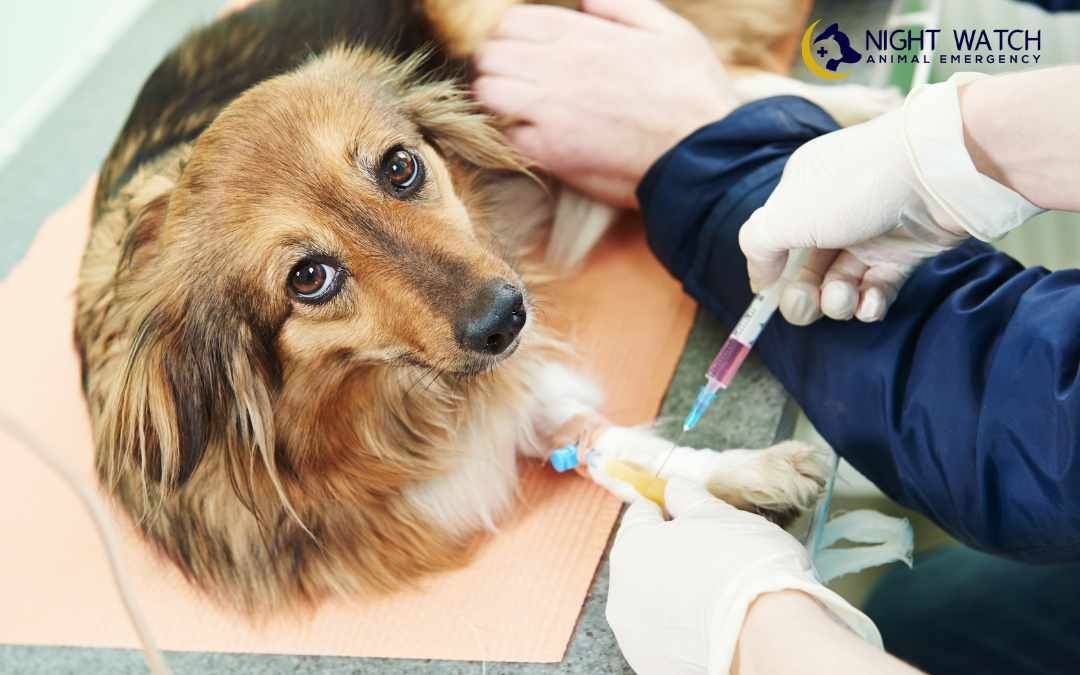Routine pet blood work is one of the most valuable tools your veterinarian has for protecting your dog or cat’s long-term health. Many diseases, such as kidney issues, liver disease, diabetes, or thyroid problems, develop quietly beneath the surface, showing little to no outward signs until the condition has progressed.
Regular blood testing helps detect these problems early, often before symptoms appear, allowing for timely treatment and better outcomes. It also helps your vet establish a baseline for your pet’s normal values, making it easier to spot subtle changes over time. Simply put, routine blood work gives your pet the best chance at a long, healthy, and happy life.
Understanding Pet Blood Work
Before diving into details, it helps to know what pet blood work actually measures and why it’s essential for early disease detection in pets.
- Blood tests evaluate organ function, hydration, infection, and immunity.
- They provide a baseline for your pet’s normal values, vital for spotting changes later.
- Veterinarians use results to diagnose conditions before symptoms appear.
Why Regular Blood Tests Matter for Pet Wellness
Just like humans, pets age faster than we realize. Annual or semi-annual blood testing allows vets to track subtle changes in their internal health.
- Early Detection: Identifies diseases like kidney failure or diabetes before they become severe.
- Preventive Care: Supports proactive treatment and lifestyle changes.
- Safe Anesthesia: Confirms your pet’s body can handle surgery or medication.
- Peace of Mind: Keeps pet owners informed about ongoing health trends.
Key Types of Pet Blood Tests
reveals different aspects of your pet’s health. Here’s what vets commonly check:
Complete Blood Count (CBC)
- Measures red and white blood cells and platelets.
- Detects infections, inflammation, anemia, and immune responses.
- Helps identify parasites or internal bleeding.
Biochemistry Profile
- Evaluates liver, kidney, and pancreas functions.
- Tracks blood sugar, protein, and electrolyte levels.
- Useful for detecting organ diseases or metabolic disorders.
Thyroid & Hormone Tests
- Common in older cats and dogs.
- Detects thyroid imbalance, adrenal gland issues, and hormonal disorders.
- Supports weight, mood, and energy management in senior pets.
Hidden Health Issues Blood Tests Can Reveal
Routine blood work often uncovers health problems that even the most attentive pet owners might miss.

- Kidney Disease: Detected early through elevated creatinine or BUN levels.
- Liver Issues: Abnormal enzyme levels indicate liver stress or infection.
- Diabetes: High blood glucose signals metabolic imbalance.
- Anemia: Low red blood cell count may indicate internal bleeding or poor nutrition.
- Infections: White blood cell patterns show bacterial or viral infections.
- Hormonal Disorders: T4 and cortisol levels reveal endocrine imbalances.
How Often Should You Schedule Blood Tests?
Frequency depends on your pet’s age, health status, and breed. However, general veterinary guidelines recommend:
- Puppies/Kittens: Baseline testing during initial vet visits.
- Adults (1–7 years): Annually during pet wellness checks.
- Seniors (7+ years): Every 6 months or as advised by your vet.
- Before Surgery: Always recommended to ensure anesthesia safety.
Tip: Discuss customized testing intervals during your pet’s routine vet exams; it ensures accurate monitoring throughout each life stage.
The Role of Regular Vet Exams in Disease Prevention
Blood tests are just one part of a complete wellness check. Combining them with physical exams gives vets a full picture of your pet’s overall health.
- Physical exams detect external issues like lumps, ear infections, or dental disease.
- Blood work monitors internal systems invisible to the naked eye.
- Together, they provide early warning signs and reduce emergency risks.
Where to Get Reliable Pet Blood Tests in San Antonio
If you’re searching for pet blood tests in San Antonio, look no further than Night Watch Elite Animal Emergency. Our state-of-the-art facility provides rapid in-house diagnostics and compassionate emergency care, 24/7.
- Advanced laboratory equipment for fast, accurate results.
- Experienced veterinarians specializing in early disease detection.
- Convenient location and immediate care when your pet needs it most.
- Trusted by San Antonio pet owners for urgent and routine testing alike.
Visit Night Watch Elite Animal Emergency to learn more or schedule your pet’s next wellness check.
FAQs
How long do pet blood test results take?
Most in-house results are ready within minutes; complex tests may take 1–2 days.
Is fasting required before blood tests?
In most cases, yes, fasting for 8–12 hours ensures accurate glucose and enzyme readings.
Do blood tests hurt my pet?
Only a small needle prick is involved. Pets tolerate it well, and discomfort is minimal.
How much does pet blood work cost?
Costs vary by test type, but routine panels are affordable and essential for preventive care.
Final Thoughts
Regular pet blood work is one of the simplest and most effective ways to protect your pet’s health. It helps detect hidden issues early, track changes over time, and prevent serious illness before symptoms appear. By making blood testing part of your ongoing vet exams, you give your fur friend the best chance at a longer, healthier, and happier life.
Keep Your Pet Healthy | Schedule a Blood Test Today!
Your pet depends on you for more than love and attention; they rely on you to keep them healthy. Routine pet blood work isn’t just about diagnosing problems; it’s about preventing them before they start.
Schedule your pet’s next wellness exam at https://nightwatchanimalemergency.com/ and ensure a lifetime of health and happiness.
